
Blog SIMOLex (5)
CASHEW IN NIGERIA – BEST EXPERT INFORMATION ON EXPORTATION OF NIGERIAN CASHEW
Written by Olajire Olaitan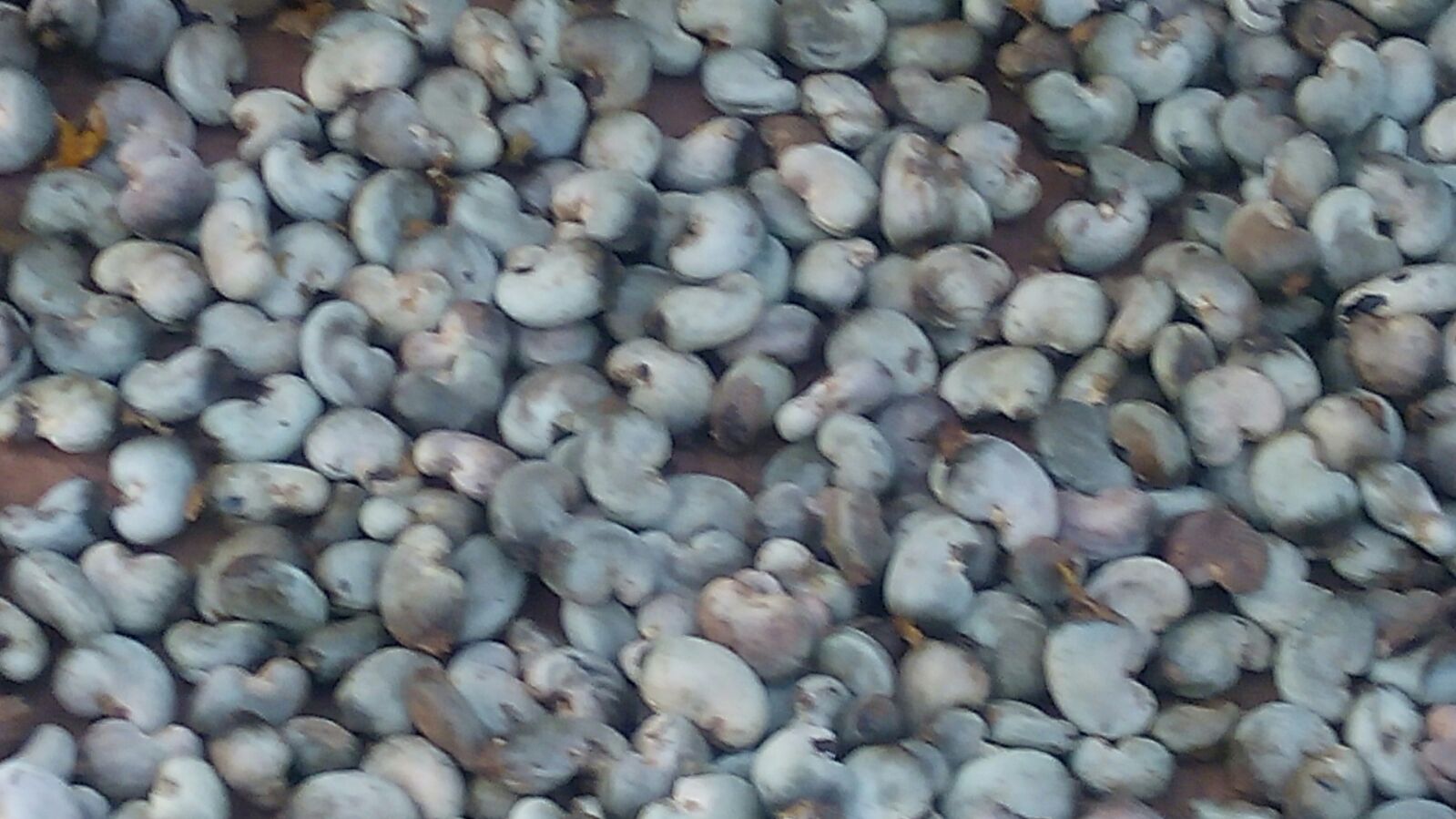
CASHEW NUTS
Cashew is an edible nut which is rich in oil and protein. The kernet is found inside a kidney-shaped (or, boxing-glove shaped, if you prefer) inedible nut of a cashew apple. Cashew kernels are packed with calories, soluble dietary fiber, vitamins, minerals and numerous health-promoting phyto-chemicals that help protect form diseases and cancers.
All over the world, cashew is primarily used as snacks although they are frequently used in Indian cuisine too. 80% of global use is by the snack industry which makes use of the whole kernels. A lesser industry is the food processing industry which makes use of broken kernels, where they are used for chocolate bars, confectioneries, baked foods, cashew butter, cake and ice cream toppings and breakfast cereals.
WHERE CASHEW NUTS CAN BE FOUND IN COMMERCIAL QUANTITIES IN NIGERIA
In Nigeria, cashew season is from February to May but is often traded for much longer (by traders who had stored the nuts during the season). Cashew can be found in exportable commercial quantities in Oyo, Osun, Kogi, Edo, Niger, Kwara, Imo and Enugu States. In terms of location, if you are interested in getting good quality and quantity of cashew nuts in Nigeria, the specific locations you may target are Ogbomoso, Iseyin, Oyo Town, and Saki in Oyo State, Iwo and Ejigbo in Osun State, Anyigba and Ankpa in Kogi State, Auchi in Edo State, Lafia in Nassarawa State, Keffi in Niger State and Okigwe in Imo State.
Outside Nigeria, Nigeria’s cashews are generally divided into two groups - Ogbomoso Cashew and others. Kogi State is the largest producers of cashew nuts in Nigeria.
HOW TO BUY CASHEW NUTS
You can either buy wet or dried from the farmers or Local Buying Agents (LBAs). “Dried” cashew nuts are more expensive than the “wet” ones. When properly dried, cashew nuts from Ogbomosho will lose 3-5% of its total weight while those from other part of the country will lose about 10% of their weight hence, the premium on the price of the dried nuts. However, in spite of the premium price placed on the dried nuts, experience has shown that the farmers/LBAs will usually cut corners and would not dry the nuts to good export conditions. This is so that they do not suffer up to the expected weight-loss. Therefore, it is always advisable to buy wet and dry to standard yourself.
We have a post that explains the best ways to buy raw cashew nuts in Nigeria and you can find it here.
In terms of payment methods, there are generally four ways cashew nuts, or any other agricultural produce for that matter, are purchased form the farmers or LBAs- advance payment; spot payment; payment on delivery or advance-deposit-and-balance-on-delivery payment. Understanding the dynamics of payments can make or break your export business. Knowing how to deal with your suppliers is more-or-less an art perfected only by experience.
The post on this blog with the invaluable explanation on this is titled: HOW TO BUY RAW CASHEW NUTS IN NIGERIA.
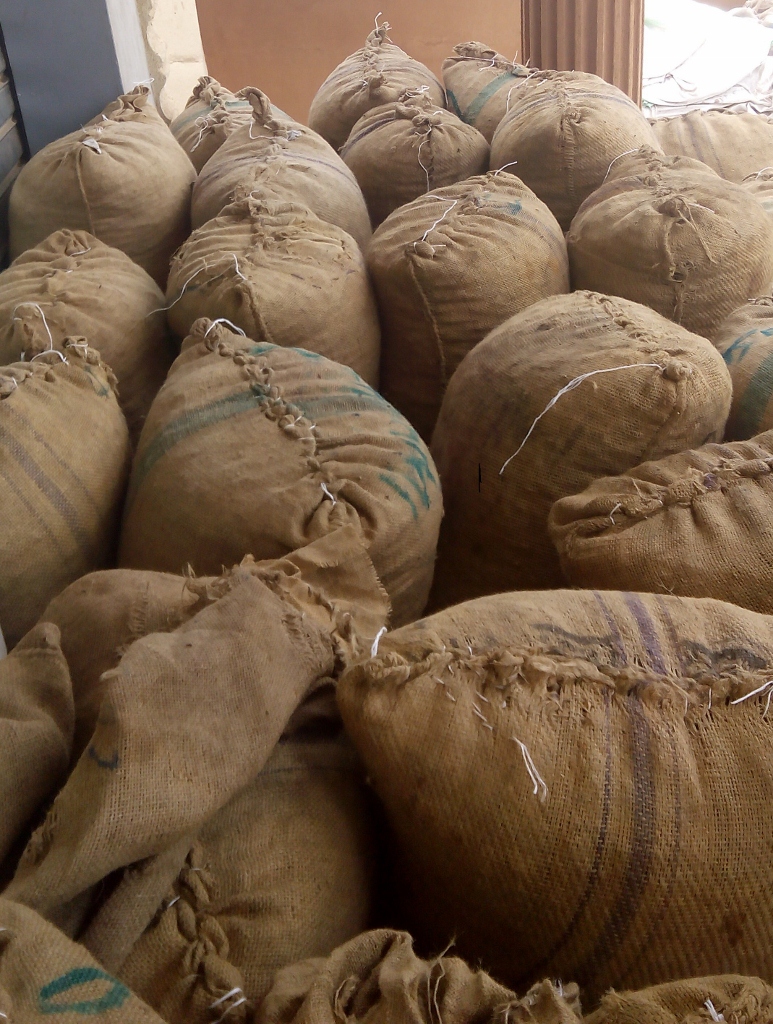
OGBOMOSHO CASHEW
Although all cashew nuts are similar, they actually vary in size, oil contents, shell thickness and ease of processing. The quality of cashew in Nigeria differs largely based on the areas they are grown. The Cashew with the best quality in Nigeria is known to the outside world as Ogbomoso Cashew. In reality, there were no cashews from Ogbomoso. Instead, Ogbomoso was a central collection centre for cashews in its entire axis such as Iseyin, Iwo, Saki and others. However, in recent history, several cashew plantations are present in Ogbomoso.
At the beginning of the season (before the rains) the specification of nuts found in this axis is KOR (Kernel Turn-Out Ratio) of between 48 and 52ibs and it has the Nut Count of around 170-185/kg.
For the Nigerian market, Ogbomosho cashew is considered premium quality and, therefore, commands an extra premium price in the international market. The reason for this is largely because it does not have peeling problems during and processing and also because of the size of the kernels inside the cashew nut.
OTHER CASHEWS
Of the other areas in Nigeria where cashew nuts can be found in commercial quantities, Ayingba and Ankpa and other areas in Kogi States are of high quality. At the beginning of the season, the KOR is about 48-50 (although it drops quickly as we get into the season). We also have KOR of 48 in Auchi, 46 in Niger State and 45 in Lafia, Nassarawa State and Okigwe in Imo State at the beginning of the season. Also, the Nut counts of these other cashew nuts are 200-220/kg.
PRICING
The pricing of cashew nut is largely based on its location, dryness, nut counts (how large the shells are), shelling outturns (yield), and evidence of fungal or insect damage. There is also, of course, the bargaining powers of the interested buyer and the seller. Interestingly, even the parallel market rates of foreign exchange also do have an important role to play in the eventual amount RCN are sold for.
Vitally, it is proper to conduct an assurance test on the quality of the RCN before the exporter agrees to pay for the RCN. This is because at any given time, there are always different prices for different qualities of RCN. It is important, therefore, to know exactly what the exporter will be buying as this will aid, in no small measure, the price that the exporter should be willing to pay the farmer/LBA for the RCN.
You can find more information on how to know the quality of cashew nuts in the post THE SPECIFICATION AND QUALITY OF RAW CASHEW NUTS IN NIGERIA.
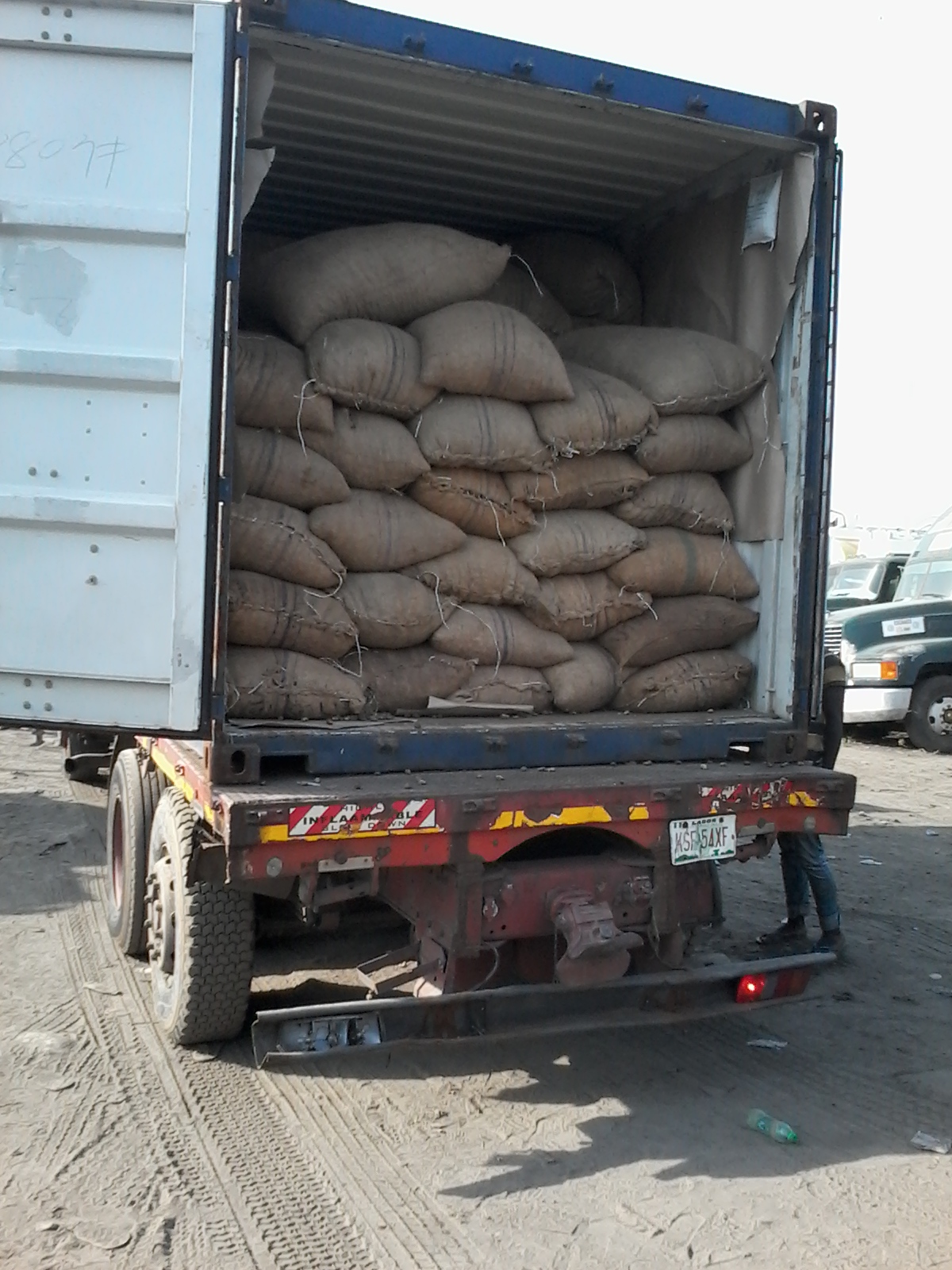
BEST PREPARATION OF CASHEW NUTS FOR EXPORTATION
Regardless of how good your nuts are when you purchase them, how you handle them afterwards can maintain, reduce, or improve the quality of your nuts. If you do not adopt the best method of preservation and drying, what you packaged and send to your buyer will undoubtedly be different from the horror your buyer will get when they open the container containing the RCN you sent to them.
When you get your cashew nuts, there are generally going to average a moisture level of around 16%. This moisture level is from two difference sources in a cashew nut. Cashew nuts are required to be very dry (at most, 10% moisture) if they are going to be suitable for exportation.
You can find our in-depth analysis specially written to help you understand this crucial part of execution of RCN under the heading: BEST METHODS TO ADOPT IN THE PREPARATION OF RAW CASHEW NUTS FOR EXPORTATION.
HOW TO KNOW THE SPECIFICATION AND QUALITY OF RAW CASHEW NUTS IN NIGERIA
Written by Olajire Olaitan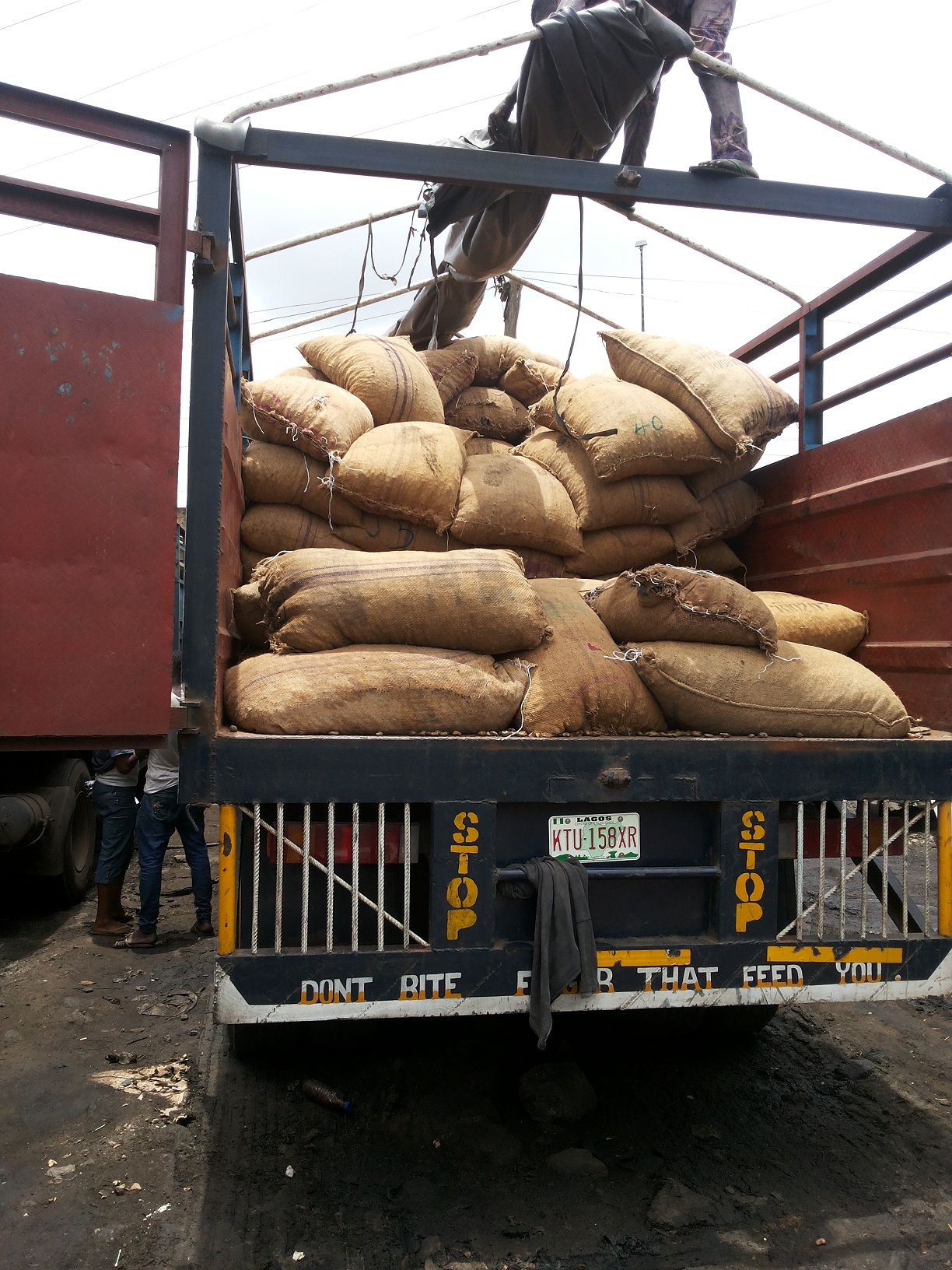
DIFFERENT TYPES OF CASHEW NUTS IN NIGERIA
There are different types of Raw Cashew Nuts (RCN) that can be found in Nigeria. During processing, they give different outputs. You can find more information on Nigerian Cashew Nuts on CASHEW IN NIGERIA – BEST EXPERT INFORMATION ON EXPORTATION OF NIGERIAN CASHEW.
The specification and quality of RCN are largely based on their location, time of the season, moisture level amongst other things. In this post, you will find the knowledge that will help you be a better judge of these details and also get equipped as to what you must do before you settle for the “quality” information you get from a farmer or Local Buying Agents (LBAs).
SPECIFICATION OF CASHEW NUTS IN NIGERIA
In the same area, one will find different quality of RCN at the beginning, middle and end of the season. We are going to consider the average quality one can find at the different locations at the beginning of the season- which is when they are at their peak.
Ogbomosho Others
Nut Count: 170-185/kg 180-220
KOR: 48-52lbs 46-51lbs
Moisture Content: 8%Max 8%Max
Defective Nuts: 15%Max 15%Max
Foreign Matter: 5% Max 5% Max
THINGS THAT AFFECTS THE QUALITY OF CASHEW NUTS
- Quality of the Raw Cashew Nut (RCN), which is based on its size, yield and defectiveness.
- The moisture of the nuts.
- How the RCN are stored, including the kind of bags where they are stored.
- The method adopted to dry the cashew nuts.
- The temperature of the warehouse where the nuts are stored.
- The preparation of the nuts for exportation.
- The dressing of the container.
- The stuffing of the RCN into the container.
Each of the preceding items mentioned can all have positive or negative effect on RCN. If only one of them is not properly understood and conducted, the fact that the rest were done correctly will, most likely, count for naught as the result will be a bad cargo. Below is a picture of a bad cargo when it arrived at its destination port. The fact that the KOR of the RCN and even the type were fantastic when the goods were put in the container did not matter eventually as what the Buyer got was a worthless cargo. Perhaps more than anything else in exportation of agricultural commodities, one must learn and know how to properly prepare each agricultural commodity for exportation. The way you prepare Tiger Nuts is not the same way you prepare RCN or Dried Ginger Slices. The lack of adequate knowledge of the intricacies involved in the perfect execution of export contracts have led to heavy losses for both exporters and buyers.
The exporter must have sound understanding of how to know the quality of RCN or he would pay dearly for it. The farmers/LBAs are interested in selling their commodities; they will not explain the quality to you. In fact, most of the time, they embellish the quality of their commodities in order to either sell them quickly or at a price higher than the normal price of their commodities or both. If the exporter is inexperience in this regard, it is vital to enlist the support of a “quality” assurance person or company.
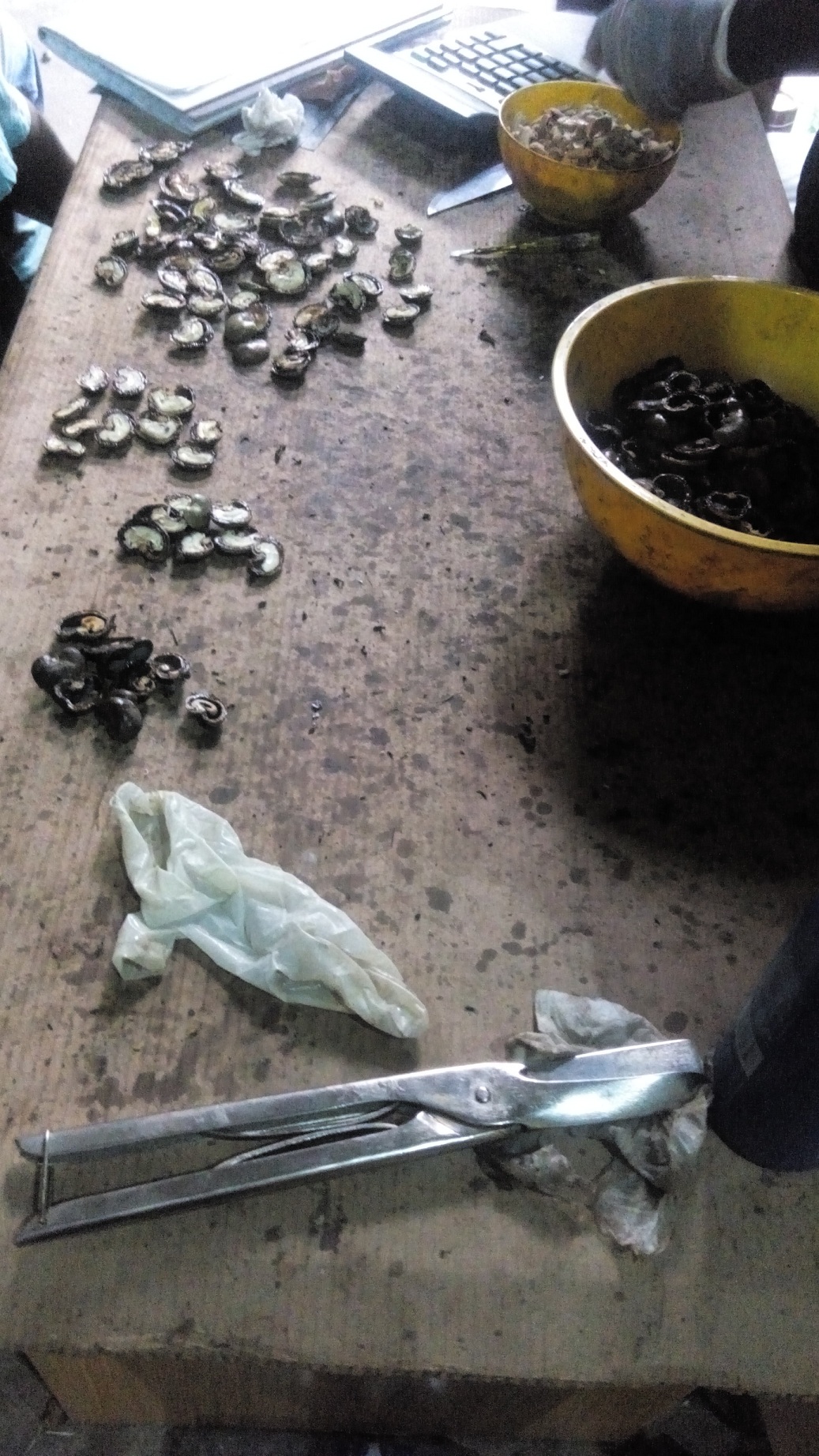
HOW TO TEST FOR, AND KNOW, THE QUALITY OF RAW CASHEW NUTS IN NIGERIA
What a quality assurance person/company will do is to take random sampling of the RCN you are interested in buying, cut them and then analyze the RCN in order to arrive at their KOR, moisture level and other relevant information. This is a vital test that should be conducted before the exporter buys the RCN. It will help the exporter know whether or not the RCN meet, or can meet, his buyer’s specification, the amount he should pay for that quality of RCN and general information about the RCN he is about to buy.
The key things to watch out for, and for which results will be got during the quality test, are:
- The size of the cashew nuts- that is, the nut count;
- The dryness of the RCN- that is, the moisture content;
- The ratio of good nuts;
- The ratio of rotten nuts;
- The ratio of spotted nuts;
- The ratio of immature nuts; and
- The Kernel Out-turn Ration (KOR).
To perform the “quality” test, the sample size required is one kilogram. First, samples will be randomly obtained from, at least, 30% of the different bags of RCN which is about to be bought. All the samples are then combined together to become one new sample. The sample is further divided into different portions. Afterwards, one portion is taken at random from where one kilogram (1kg) is measured out for the test. This 1kg will then be subjected to the test (which basically involves cutting the cashew nuts in halves and analyzing them) and the result extrapolated to determine the quality of the whole RCN lot.
During the test, the nuts will be separated into good nuts, spotted nuts, immature nuts and rotten nuts. Different weights are attached to each set (1, 0.5, 0.5 and nil respectively) and this is used to multiply the weight of each of the categories before the KOR of the cargo is determined.
Below are pictures showing such an “assurance” test taking place before we made the decision on whether to buy RCN and for what price earlier this year:
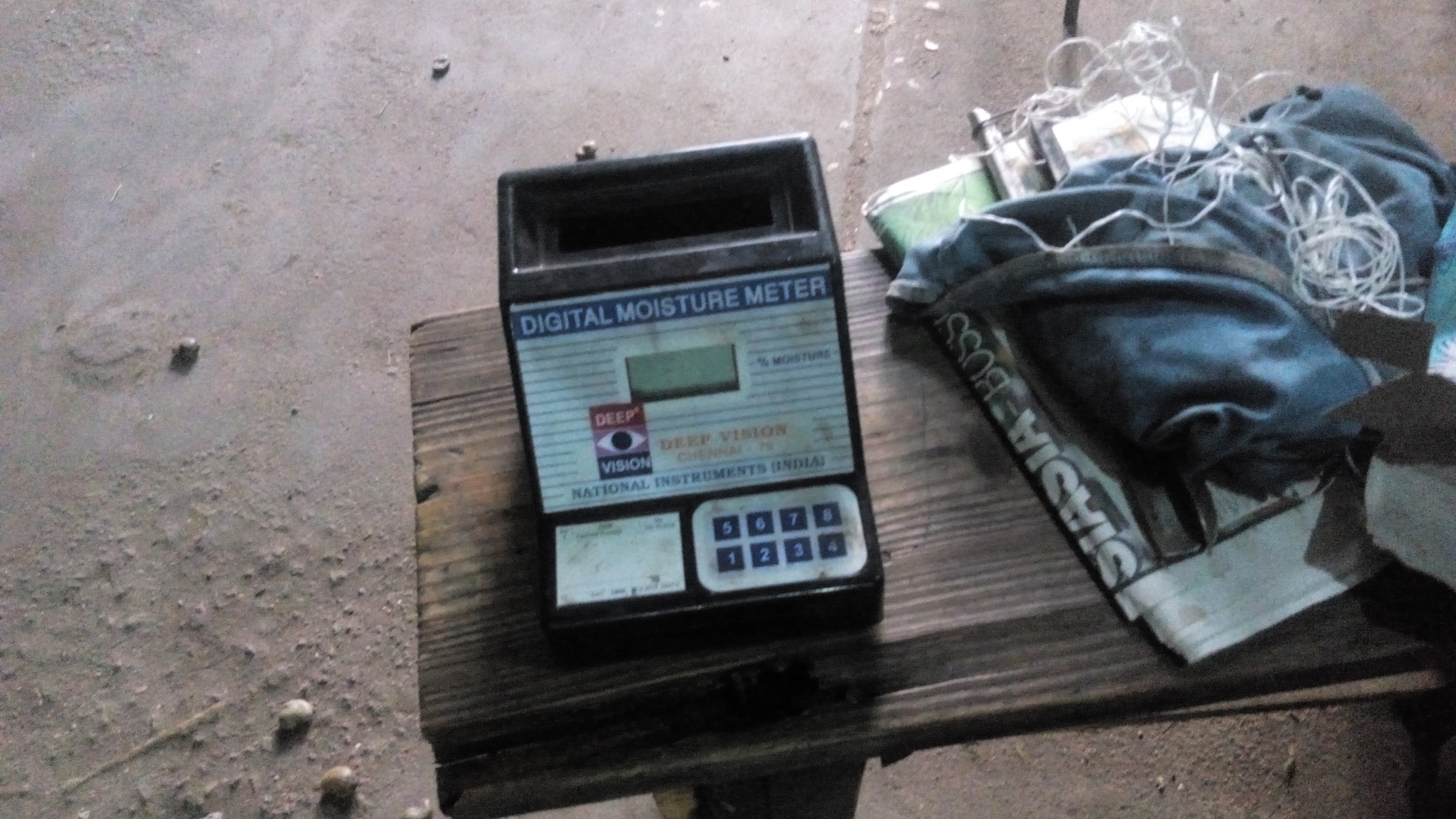
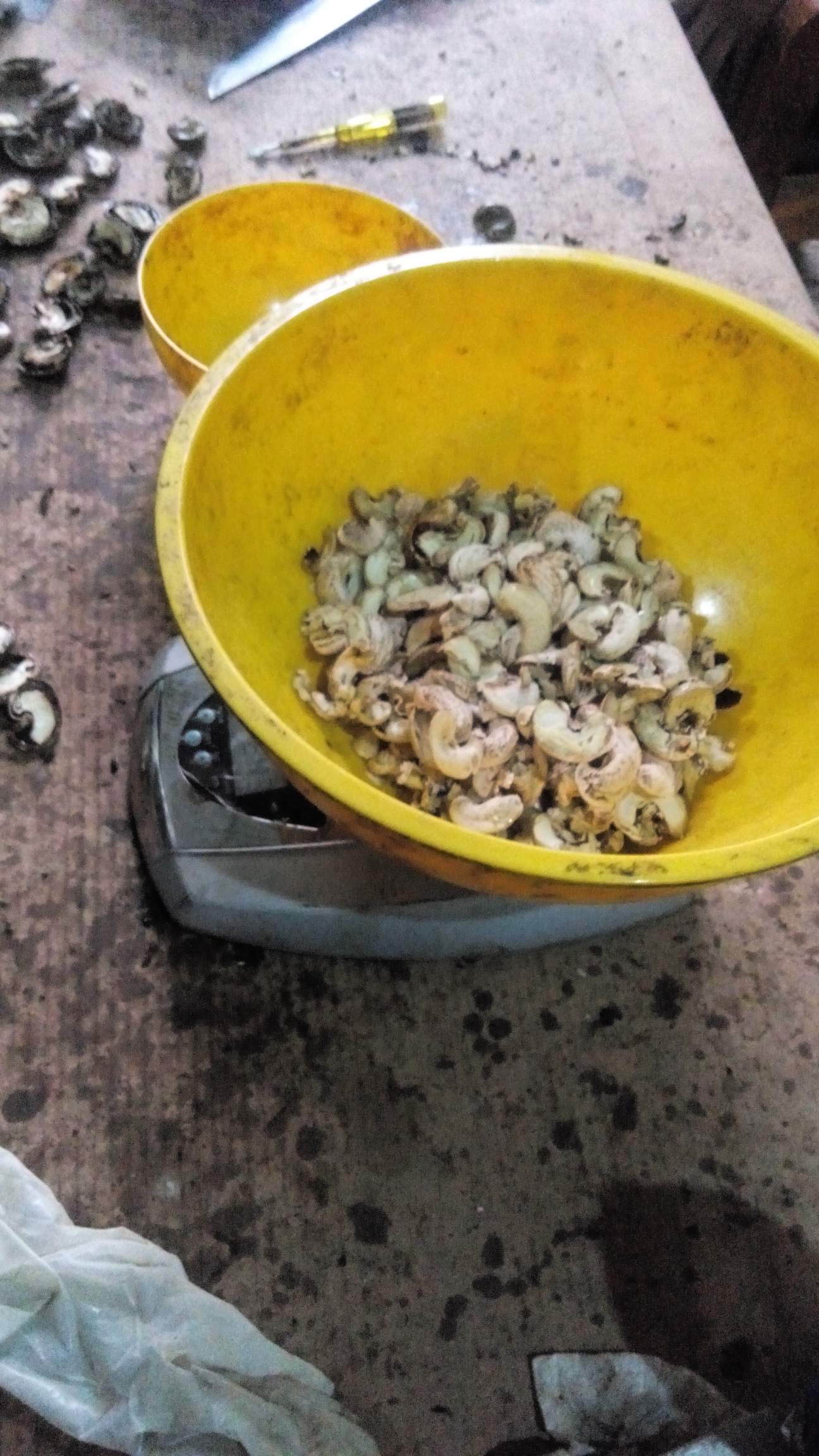
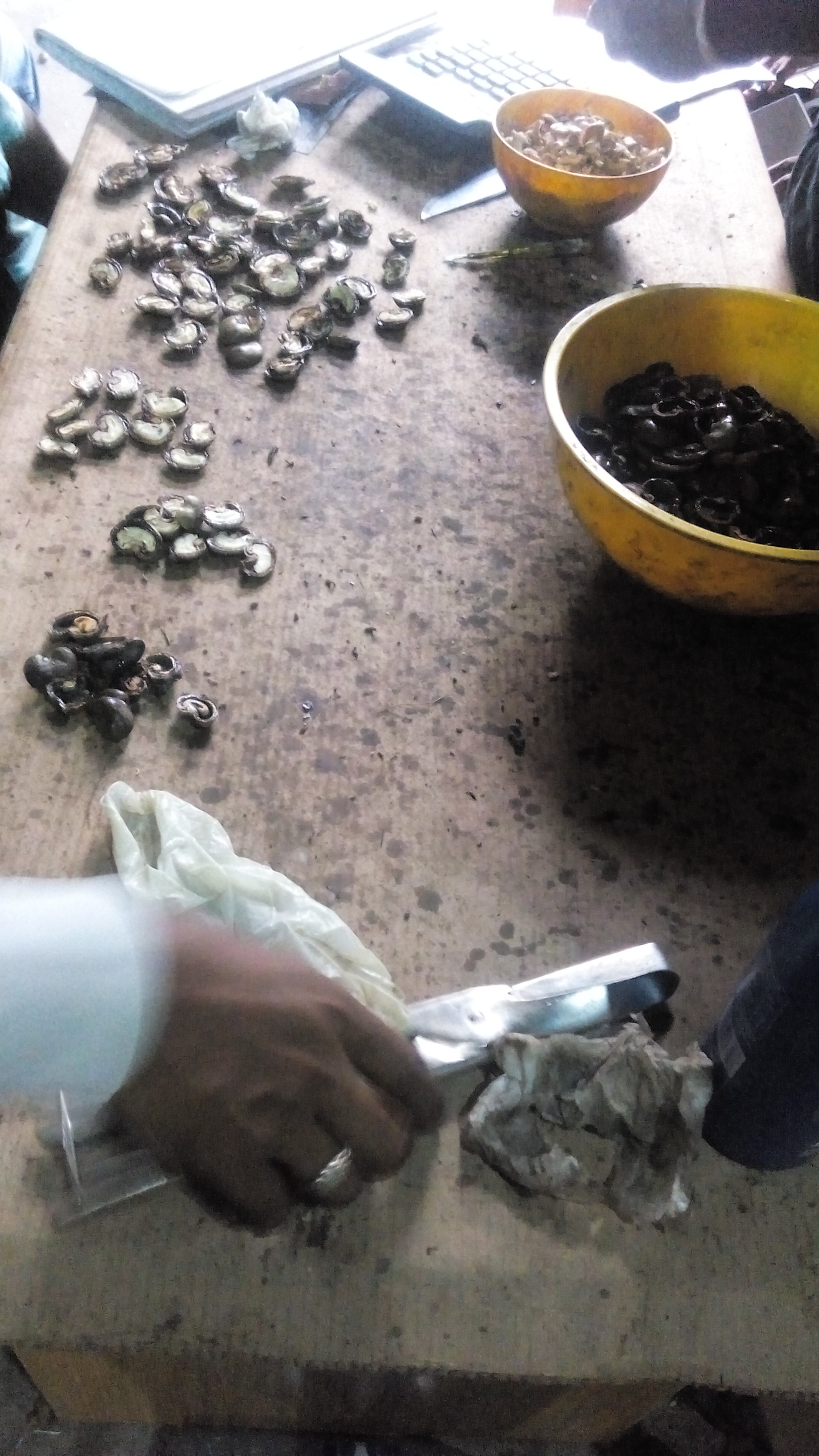
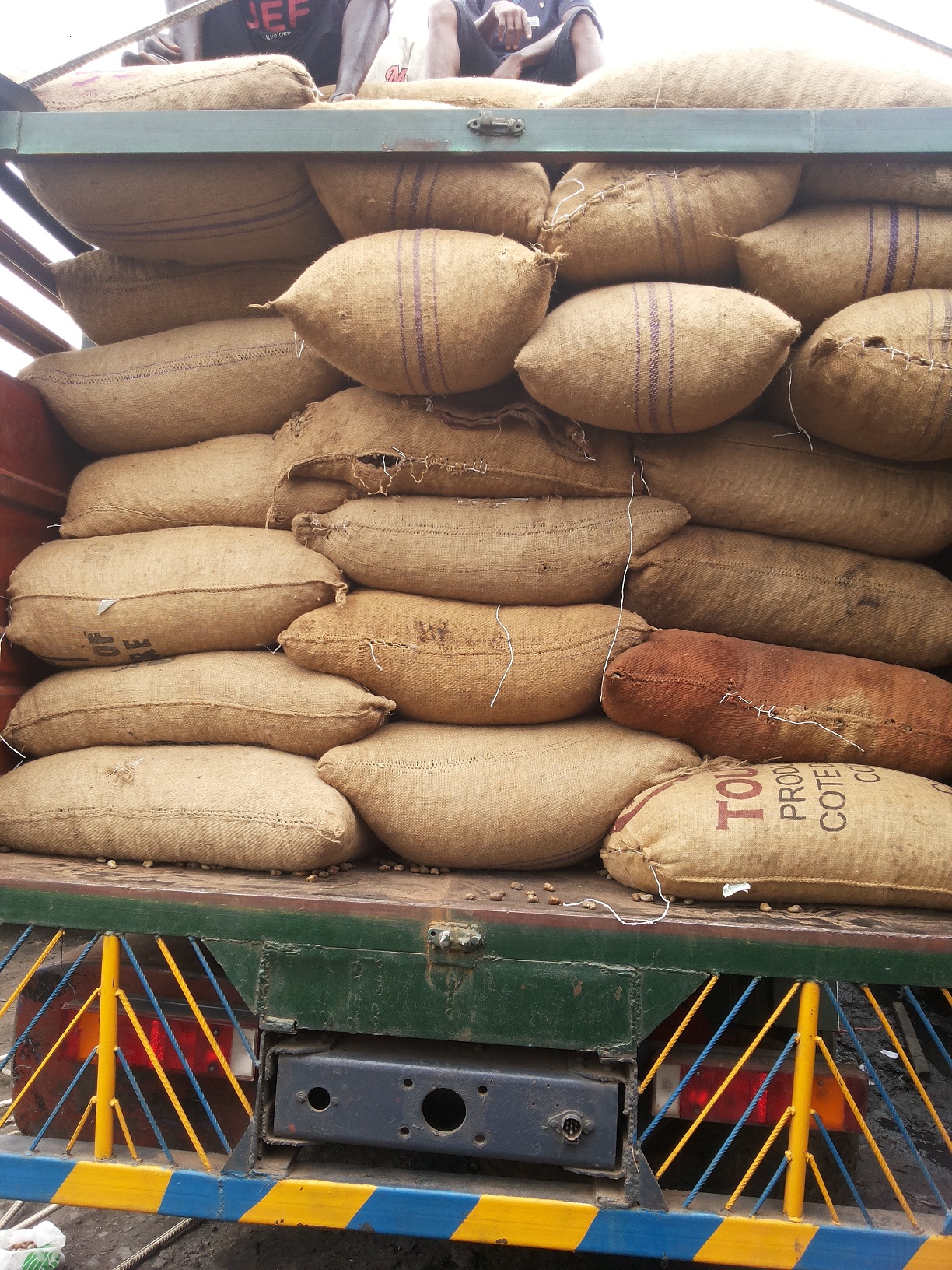
We have established in another post that there are different types of Raw Cashew Nuts (RCN) in Nigeria. We have also stated (in yet another post) the methods by which the quality of an RCN cargo can be determined in order to know whether the cargo meets with the expected specification of the exporter’s buyer and, also, in order to know the right price to place on the cargo.
Knowing the right method to use at particular times in the season comes with experience and business acumen. It can affect whether or not an exporter over-pays, meet his contractual obligations, buys quality RCN or/and makes profit. Skills are required to ensure that this aspect does not ruin your season and, indeed, your business.
You can either buy wet or dried from the farmers or Local Buying Agents (LBAs). “Dried” cashew nuts are more expensive than the “wet” ones. When properly dried, cashew nuts from Ogbomosho will lose 3-5% of its total weight while those from other part of the country will lose about 10% of their weight hence, the premium on the price of the dried nuts. However, in spite of the premium price on the dried nuts, experience has shown that the farmers/LBAs always cut corners and will not dry the nuts to export condition. This is so that they do not lose up to the expected weight. Therefore, it is always advisable to buy wet and dry to standard yourself.
In terms of payment methods, there are generally four ways cashew nuts, or any other agricultural produce for that matter, are purchased form the farmers or LBAs- advance payment; spot payment; payment on delivery or advance-deposit-and-balance-on-delivery payment. Understanding the dynamics of payments can make or break your export business. Knowing how to deal with your suppliers is more-or-less an art perfected only by experience.
For advance payment, some exporters prefer to invest in the farmers long before the cashew nuts are ready for sale. They deposit money with them, usually huge amount. When the cashew season comes around, parties would then meet to agree on the amount each ton would be sold for (taking note of the going rate at the time) and supplies would be made. The benefit of this is that the exporter is expected to be the first one to be sold to by the farmer immediately the season begins. Another form of advance payment occurs when the exporter pays the farmer or LBA in full before delivery is made to him. The disadvantage of up-front payment is that the farmer/LBA, having already spent your money, may sell the goods to others first in order to benefit more. Also, the quality or quantity (or both) may be lower than agreed upon but you will be force to take them so as not to lose the money you have paid.
For spot payment, the exporter would pay and take delivery of the cashew immediately. It could be that the exporter will go over to the location of the farmer/LBA or agree that they bring the cashew to his own warehouse. Usually, the cashew nuts will be tested to confirm their KOR and other important details before the cashew nuts are accepted and paid for. While there is a lot of security of funds in this method, it may be impracticable at certain periods or slow, especially when they are a lot of exporters willing to buy on more favourable terms to the farmer/LBA. Timing is also a factor. The period in the season when the trade is to be consummated do have impact on whether or not this method will be viable.
Where the advance payment method puts the advantage with the farmer/LBA, the payment-on-delivery method of payment puts the advantage firmly with the exporter. This is because the LBA will have to undertake all the costs of the cashew nuts and transportation to the agreed destination and then the exporter will check and confirm the cashew nuts before payment is made. To pull this off, the exporter has to have some clout, pay far above others, demand for a huge volume, or is interested in buying at time when there is a glut in the market or were there are only few interested buyers. The LBA runs the risk of having the entire cargo rejected or underpriced and so will rarely agree to this kind of arrangement.
The final method is the advance-payment-and-balance-payment-on-delivery method where the exporter will make initial payment to the farmer/LBA and the balance will be made upon delivery of the goods to the exporter. There are instances when the parties may settle for this but it is not a very commonly used method. The risk is shared between the parties yet it leaves each of them quite exposed. Still, it can become very useful where the farmer/LBA is asking for advance payment and the exporter is interested only on payment on delivery.
It is important to know the advantages and disadvantages of each payment method and understand the circumstances where each can be used as well as the kind of farmer/LBA one can adopt certain payment method for. You have to develop the right skill-set in this area for it will affect every other area of your execution and exportation.
MAJOR PLAYERS/STAKEHOLDERS IN THE EXPORTATION OF AGRICULTURAL COMMODITIES IN NIGERIA
Written by Olajire Olaitan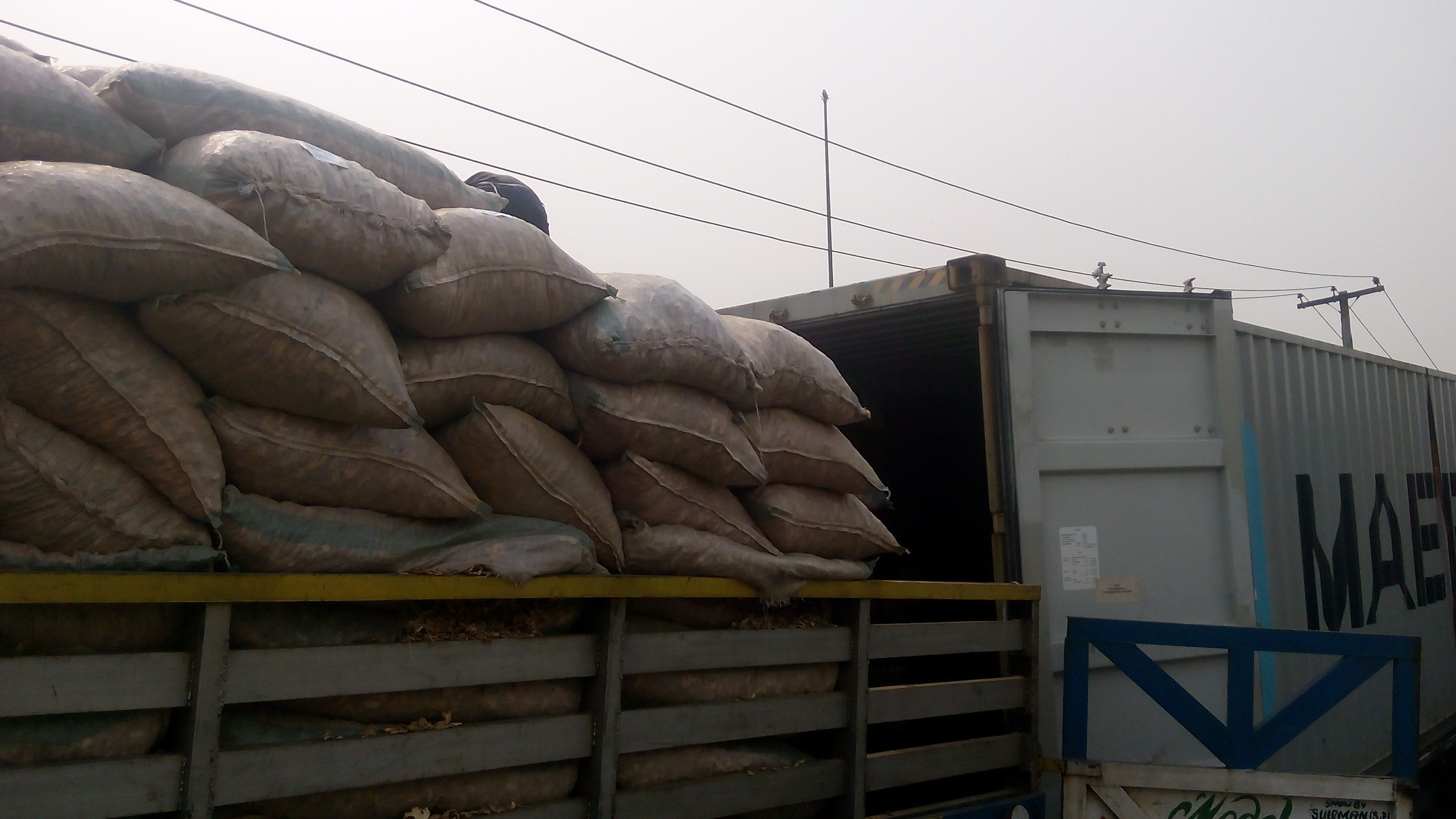
To fully understand the business of exportation of agricultural commodities, it is important to be aware of the different roles played by different stakeholders across the value chain. You will have to deal with virtually all of them- directly or indirectly- if you are to export agricultural commodities. The following are the stakeholder who will have a say on your export business.
- Buyers/Customers/Off-takers
- Brokers
- Farmers
- Local Buying Agents (LBA)
- Suppliers
- Quality Assurance professional
- Warehouse providers
- Government- Local and State- agriculture produce authorities
- Staff- Ad hoc and permanent
- Haulage providers
- Insurance providers
- Forwarder
- Bank
- Warehouse Managers/Warrant officers
- You, the exporter
BUYERS/CUSTOMERS/OFF-TAKERS: There can be no export contract if there is no one willing to pay for the commodities.There has to be someone who would demand for the commodities before an export process can even begin. The off-takers are usually in foreign countries and some particular commodities are common in some countries. Sometimes, however, the buyer may come down to Nigeria and merely engage the services of the exporter to execute the contract. The exporter will supply locally to the buyer who would arrange for how they would be exported. The buyer can, sometimes, even ask the exporter to do the entire process for him but export only through the buyer’s own local company or through an associate. The last two are not really exportation, from the angle of the exporter so it is in the exporter’s interest to insist on doing the entire process themself.
BROKERS: These are people who connect buyers with exporters for a fee, called brokerage commission. The role of a broker is that of an intermediary. Sometimes, there can be more than one broker in an export deal. Either or both parties may be connected through one or more brokers.
FARMERS: Without the farmers, there could be no export. The only reason why there is an export contract is because the farmers have planted trees which produce the agricultural commodities.
LOCAL BUYING AGENTS (LBAs): Only a negligible amount of farmers have the connection to sell directly to exporters. Most can only get their commodities to exporters by, first, selling them to (or through) a commodity supplier. LBAs are the intermediaries between the farmers and the suppliers. Big LBAs, however, have enough clout (money and connection) to know exporters and so sell directly to them. Big LBAs would buy the commodities from the farmers and re-sell, at a profit, to a supplier or an exporter. Those who do not have the money to pay the farmers may agree a price with the farmer and then link the farmer with a supplier. The LBAs are extremely key in export business. Many of them sort out the particular specification required by the exporter or supplier by buying or gathering from different farmers and sorting the commodities accordingly.
COMMODITY SUPPLIERS: These set of people have their warehouses at strategic locations and engage several LBAs to comb the farmlands for commodities that meets particular specifications. Many of them were themselves, LBAs who became big. These suppliers are not exporters but they are large enough to attract exporters, who usually would not be interested in dealing directly with the farmers.
QUALITY ASSURANCE PROFESSIONAL: These set of people are vital to ensuring that the exporter buys and export the right specifications. Their duty is to conduct test on the commodities to be bough to determine quality. At the point of purchase, their results help exporters know the exact quality of the commodities, the maximum amount that should be paid for the lot and the right preparation to give the commodity upon purchase. At the point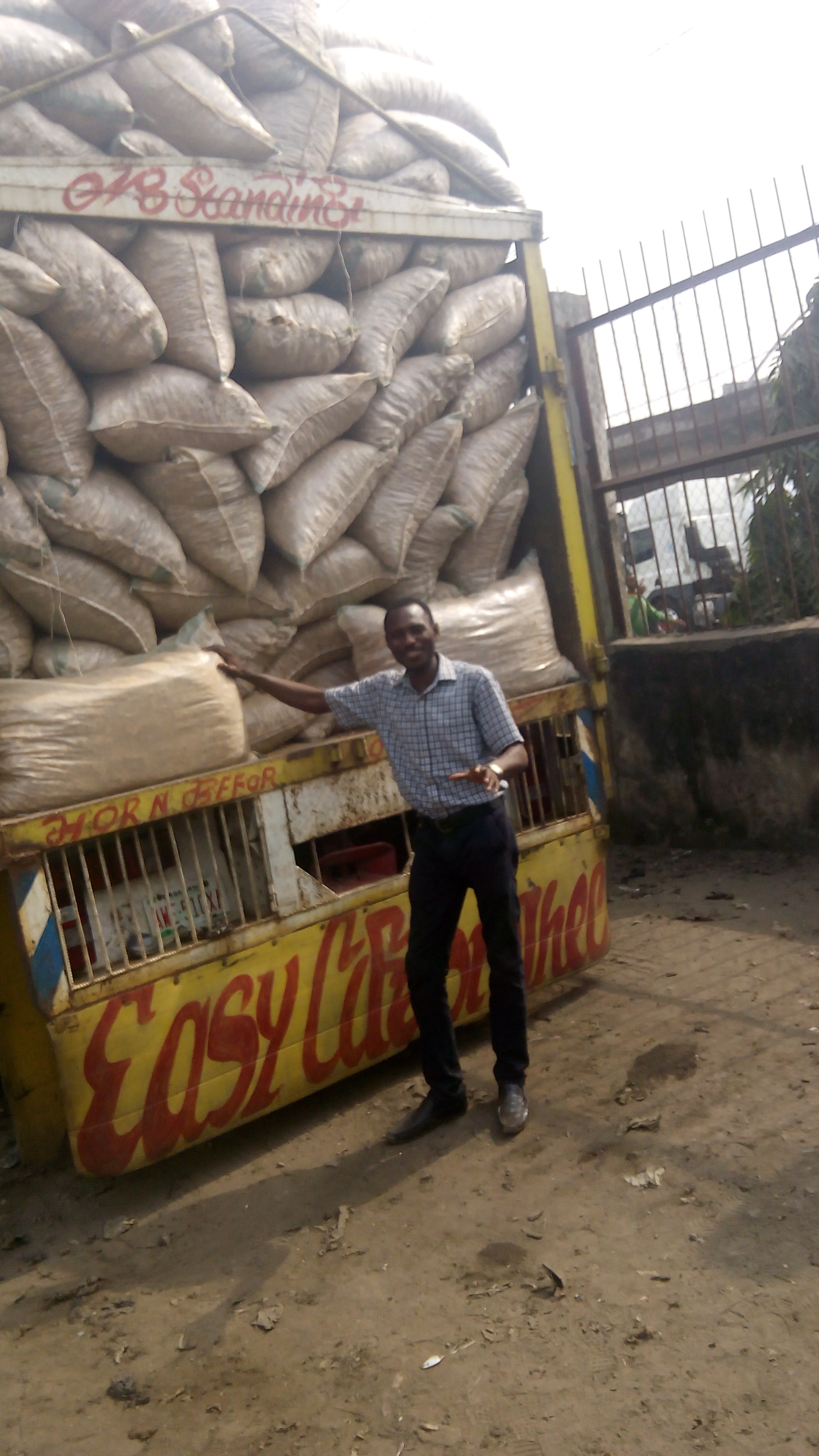 of export, their results help the exporter know whether the final commodities meet with the targeted specification.
of export, their results help the exporter know whether the final commodities meet with the targeted specification.
WAREHOUSE PROVIDERS: The exporter has to find a good place to keep his stock for further preparation, sorting, storage, preservation and security. That is where the owners of warehouses come in. The exporter has the choice to either lease the entire warehouse for a stated period of time or a portion of the warehouse.
GOVERNMENT-LOCAL AND STATE: The government also has a stake in export. For one, there are local government and state authorities which oversee the quality and movement of agriculture commodities. These bodies also impose certain fees and rates on the produce which is commonly called produce.
STAFF- AD HOC AND PERMANENT: No exporter can successfully execute an export contract alone. There is the need to have your staff on ground to oversee, record, monitor and do certain tasks important to the success of such execution. Other staff are, most likely, going to be required too on an ad hoc basis, depending on the size of the export company or/and the size of the export contract for things like loading and offloading commodities to/from trucks, drying, scaling, sowing, carrying the processed commodities etc.
HAULAGE PROVIDERS: The commodities need to be moved from place to place. First, from the farmer/LBA/supplier’s location to the exporter’s own warehouse. Secondly, from the warehouse to the port, or a warehouse close to the port. There are companies or individuals who render these trucking services and obtaining the right ones is key in any export business.
INSURANCE PROVIDER: Exportation is a business that costs a lot of money. It is important that you do your part to secure your money. Many of the agricultural commodities are sourced from the North and transported to Lagos where they are shipped out of the country. It is important to protect your investment by ensuring that you do an insurance cover for your commodity. Goods-in-transit insurance should be made to protect your commodity when you are transporting them. Also, you should ensure that you insure your warehouse too.
FORWARDER: The forwarder is a key person in the export chain. He is a specialized agent who interfaces between the exporter and the shipping line, customs and other governmental agencies. There are certain procedures that must be complied with before the exporter can be allowed to put his commodities on a vessel. The job of the forwarder is to act as the exporter’s agent and make sure the right things are done. Get a bad forwarder and all your good works before then may come to ruins. It is vital to choose the right exporter if you want to have a happy ending.
BANK: Banks are important for more than one reason. Apart from the traditional usefulness of giving loans, the banks are also important to the process because they act as interface between the buyer and the exporter when Letter of Credit (LC) is the means of payment. They would have to liase with the buyer’s bank for a fee. Also, they help the Federal Government in the collection and monitoring of NXP fees.
WAREHOUSE MANAGERS/WARRANT OFFICERS: The crux of their duties is that they help financial houses, especially the bank, monitor the activities of the exporter to ensure that the exporter truly uses the loan advance from the financial house to purchase the commodities as agreed. Sometimes, they could take the lead by paying for the commodities and then monitoring the exporter to ensure repayment of their monies and interest.
THE EXPORTER (YOU): You are, of course, a key part of the entire process as nothing can go on without you. You have to know what you are doing ifyou intend to have a successful business. You have to ensure that you build the right team around you and that you have a good understanding of the entire process. The success or failure of the entire process will, ultimately, lie with you.
BEST METHODS TO ADOPT IN THE PREPARATION OF RAW CASHEW NUTS FOR EXPORTATION
Written by Olajire Olaitan

To fully understand the business of exportation of agricultural commodities, it is important to be aware of the different roles played by different stakeholders across the value chain. You will have to deal with virtually all of them- directly or indirectly- if you are to export agricultural commodities. The following are the stakeholder who will have a say on your export business.
- Buyers/Customers/Off-takers
- Brokers
- Farmers
- Local Buying Agents (LBA)
- Suppliers
- Quality Assurance professional
- Warehouse providers
- Government- Local and State- agriculture produce authorities
- Staff- Ad hoc and permanent
- Haulage providers
- Insurance providers
- Forwarder
- Bank
- Warehouse Managers/Warrant officers
- You, the exporter

BUYERS/CUSTOMERS/OFF-TAKERS: There can be no export contract if there is no one willing to pay for the commodities. There has to be someone who would demand for the commodities before an export process can even begin. The off-takers are usually in foreign countries and some particular commodities are common in some countries. Sometimes, however, the buyer may come down to Nigeria and merely engage the services of the exporter to execute the contract. The exporter will supply locally to the buyer who would arrange for how they would be exported. The buyer can, sometimes, even ask the exporter to do the entire process for him but export only through the buyer’s own local company or through an associate. The last two are not really exportation, from the angle of the exporter so it is in the exporter’s interest to insist on doing the entire process themself.
BROKERS: These are people who connect buyers with exporters for a fee, called brokerage commission. The role of a broker is that of an intermediary. Sometimes, there can be more than one broker in an export deal. Either or both parties may be connected through one or more brokers.
FARMERS: Without the farmers, there could be no export. The only reason why there is an export contract is because the farmers have planted trees which produce the agricultural commodities.
LOCAL BUYING AGENTS (LBAs): Only a negligible amount of farmers have the connection to sell directly to exporters. Most can only get their commodities to exporters by, first, selling them to (or through) a commodity supplier. LBAs are the intermediaries between the farmers and the suppliers. Big LBAs, however, have enough clout (money and connection) to know exporters and so sell directly to them. Big LBAs would buy the commodities from the farmers and re-sell, at a profit, to a supplier or an exporter. Those who do not have the money to pay the farmers may agree a price with the farmer and then link the farmer with a supplier. The LBAs are extremely key in export business. Many of them sort out the particular specification required by the exporter or supplier by buying or gathering from different farmers and sorting the commodities accordingly.
COMMODITY SUPPLIERS: These set of people have their warehouses at strategic locations and engage several LBAs to comb the farmlands for commodities that meets particular specifications. Many of them were themselves, LBAs who became big. These suppliers are not exporters but they are large enough to attract exporters, who usually would not be interested in dealing directly with the farmers.
QUALITY ASSURANCE PROFESSIONAL: These set of people are vital to ensuring that the exporter buys and export the right specifications. Their duty is to conduct test on the commodities to be bough to determine quality. At the point of purchase, their results help exporters know the exact quality of the commodities, the maximum amount that should be paid for the lot and the right preparation to give the commodity upon purchase. At the point of export, their results help the exporter know whether the final commodities meet with the targeted specification.
WAREHOUSE PROVIDERS: The exporter has to find a good place to keep his stock for further preparation, sorting, storage, preservation and security. That is where the owners of warehouses come in. The exporter has the choice to either lease the entire warehouse for a stated period of time or a portion of the warehouse.
GOVERNMENT-LOCAL AND STATE: The government also has a stake in export. For one, there are local government and state authorities which oversee the quality and movement of agriculture commodities. These bodies also impose certain fees and rates on the produce which is commonly called produce.
STAFF- AD HOC AND PERMANENT: No exporter can successfully execute an export contract alone. There is the need to have your staff on ground to oversee, record, monitor and do certain tasks important to the success of such execution. Other staff are, most likely, going to be required too on an ad hoc basis, depending on the size of the export company or/and the size of the export contract for things like loading and offloading commodities to/from trucks, drying, scaling, sowing, carrying the processed commodities etc.
HAULAGE PROVIDERS: The commodities need to be moved from place to place. First, from the farmer/LBA/supplier’s location to the exporter’s own warehouse. Secondly, from the warehouse to the port, or a warehouse close to the port. There are companies or individuals who render these trucking services and obtaining the right ones is key in any export business.
INSURANCE PROVIDER: Exportation is a business that costs a lot of money. It is important that you do your part to secure your money. Many of the agricultural commodities are sourced from the North and transported to Lagos where they are shipped out of the country. It is important to protect your investment by ensuring that you do an insurance cover for your commodity. Goods-in-transit insurance should be made to protect your commodity when you are transporting them. Also, you should ensure that you insure your warehouse too.
FORWARDER: The forwarder is a key person in the export chain. He is a specialized agent who interfaces between the exporter and the shipping line, customs and other governmental agencies. There are certain procedures that must be complied with before the exporter can be allowed to put his commodities on a vessel. The job of the forwarder is to act as the exporter’s agent and make sure the right things are done. Get a bad forwarder and all your good works before then may come to ruins. It is vital to choose the right exporter if you want to have a happy ending.
BANK: Banks are important for more than one reason. Apart from the traditional usefulness of giving loans, the banks are also important to the process because they act as interface between the buyer and the exporter when Letter of Credit (LC) is the means of payment. They would have to liase with the buyer’s bank for a fee. Also, they help the Federal Government in the collection and monitoring of NXP fees.
WAREHOUSE MANAGERS/WARRANT OFFICERS: The crux of their duties is that they help financial houses, especially the bank, monitor the activities of the exporter to ensure that the exporter truly uses the loan advance from the financial house to purchase the commodities as agreed. Sometimes, they could take the lead by paying for the commodities and then monitoring the exporter to ensure repayment of their monies and interest.

THE EXPORTER (YOU): You are, of course, a key part of the entire process as nothing can go on without you. You have to know what you are doing if you intend to have a successful business. You have to ensure that you build the right team around you and that you have a good understanding of the entire process. The success or failure of the entire process will, ultimately, lie with you.
CONNECT WITH SIMOL
-
CASHEW IN NIGERIA – BEST EXPERT INFORMATION ON EXPORTATION OF NIGERIAN CASHEW
Written by Olajire OlaitanCASHEW NUTS Cashew is an edible nut which is rich in oil and protein. The kernet is found inside a kidney-shaped (or, boxing-glove shaped, if you prefer) inedible nut of a cashew apple. Cashew kernels are packed with calories, soluble dietary fiber, vitamins, minerals and numerous health-promoting phyto-chemicals that help protect…Written on Monday, 12 September 2016 02:13 in Blog SIMOLex Be the first to comment! Read 237547 times
-
HOW TO KNOW THE SPECIFICATION AND QUALITY OF RAW CASHEW NUTS IN NIGERIA
Written by Olajire OlaitanDIFFERENT TYPES OF CASHEW NUTS IN NIGERIA There are different types of Raw Cashew Nuts (RCN) that can be found in Nigeria. During processing, they give different outputs. You can find more information on Nigerian Cashew Nuts on CASHEW IN NIGERIA – BEST EXPERT INFORMATION ON EXPORTATION OF NIGERIAN CASHEW.…Written on Monday, 12 September 2016 02:14 in Blog SIMOLex Be the first to comment! Read 28223 times
-
HOW TO BUY RAW CASHEW NUTS IN NIGERIA
Written by Olajire OlaitanWe have established in another post that there are different types of Raw Cashew Nuts (RCN) in Nigeria. We have also stated (in yet another post) the methods by which the quality of an RCN cargo can be determined in order to know whether the cargo meets with the expected specification of the…Written on Monday, 12 September 2016 02:29 in Blog SIMOLex Be the first to comment! Read 20286 times
-
MAJOR PLAYERS/STAKEHOLDERS IN THE EXPORTATION OF AGRICULTURAL COMMODITIES IN NIGERIA
Written by Olajire OlaitanTo fully understand the business of exportation of agricultural commodities, it is important to be aware of the different roles played by different stakeholders across the value chain. You will have to deal with virtually all of them- directly or indirectly- if you are to export agricultural commodities. The following…Written on Tuesday, 20 September 2016 09:40 in Blog SIMOLex Be the first to comment! Read 24844 times
-
BEST METHODS TO ADOPT IN THE PREPARATION OF RAW CASHEW NUTS FOR EXPORTATION
Written by Olajire OlaitanTo fully understand the business of exportation of agricultural commodities, it is important to be aware of the different roles played by different stakeholders across the value chain. You will have to deal with virtually all of them- directly or indirectly- if you are to export agricultural commodities. The…Written on Tuesday, 20 September 2016 09:38 in Blog SIMOLex Be the first to comment! Read 19315 times
7 guests
no members
Your IP:216.73.216.89
